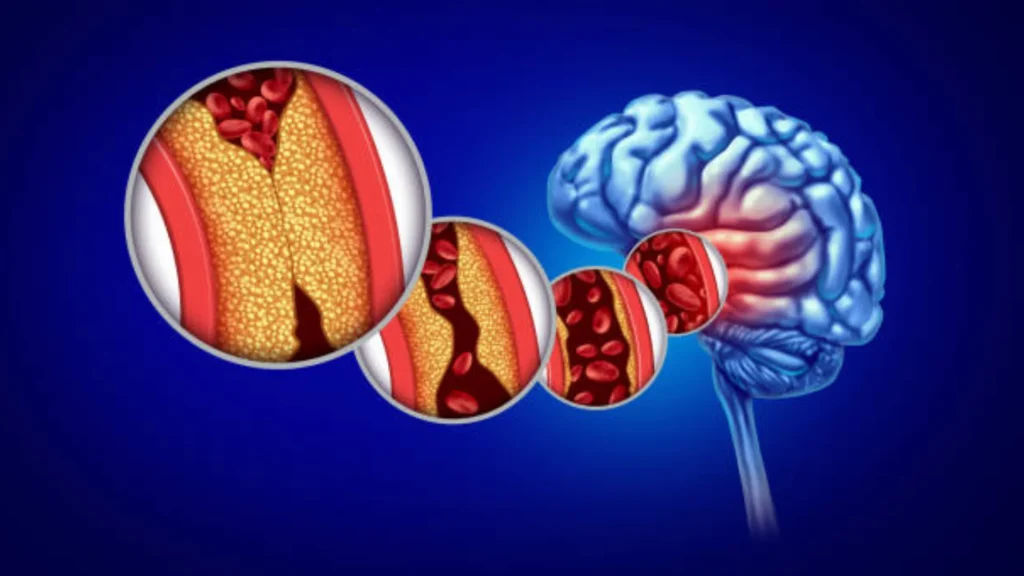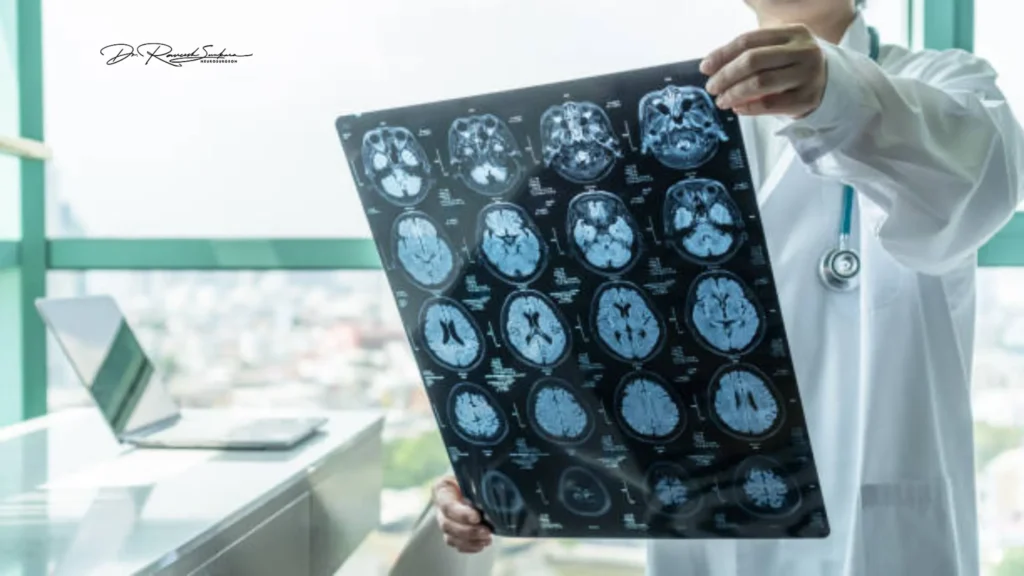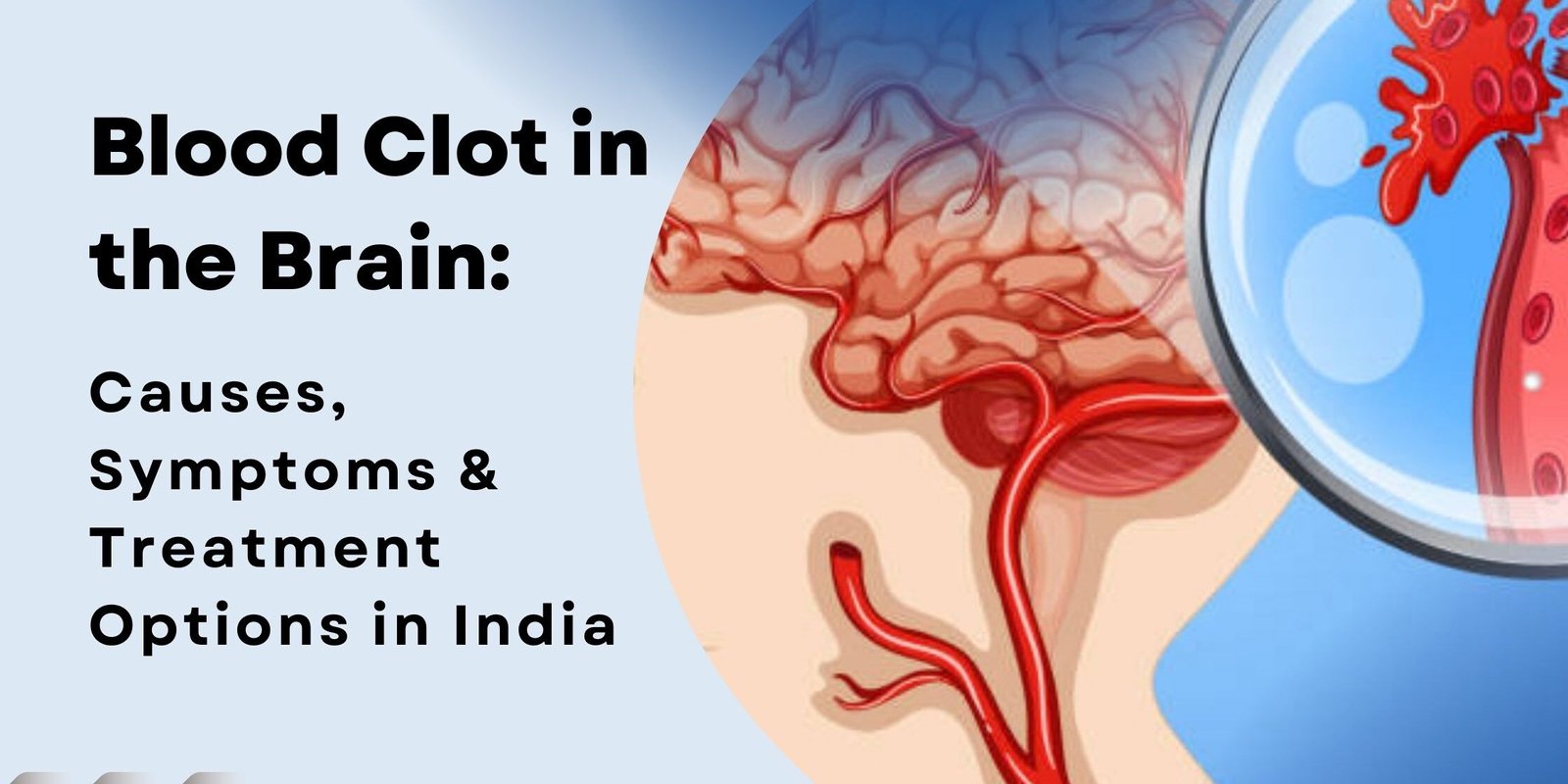A blood clot in the brain is a serious blockage that stops blood circulation and oxygen supply, which may result in a stroke or paralysis.
Did you know? According to the Indian Stroke Association, over 1.8 million people suffer a stroke each year, making it a leading cause of death and disability, and many of these events are consequences of a brain clot.
The lack of awareness about a brain clot in brain delays treatment and makes a proper recovery difficult. Knowledge of the early signs of a brain clot might save a person’s life, and additional disability might be avoided.
In this blog post, we will examine what a brain clot is, common causes, symptoms, treatment options available in India, and preventive care.
Table of Contents
Understanding What a Brain Clot Means
People frequently ask, What is a brain clot? A brain clot, formally known as cerebral thrombosis or cerebral embolism, is a blockage of the blood vessels in your brain caused by a clot, and it reduces oxygen supply to brain cells.
- Cerebral thrombosis: clots when a clot forms in a blood vessel in the brain.
- Cerebral embolism: It occurs when a clot formed at another part of the body travels to the brain.
If left untreated, the brain cells will die quickly, and there will be a brain stroke or permanent brain damage.

Common Blood Clots in the Brain.
What causes a blood clot in the brain? Below are the most common reasons for a blood clot in the brain:
- High blood pressure – Creates lesions in the vessel walls.
- Diabetes – Increases risk of clotting.
- Smoking & Alcohol – Adversely affect circulation.
- High cholesterol – Causes fat deposits in vessels.
- Obesity & Sedentary lifestyle – Slows blood flow.
- Heart disease or Irregular heartbeat – May allow clots to travel to the brain.
- Head injuries – May cause a small clot in the brain.
- Family history – Genetic clotting conditions.
Each of these factors either makes the blood thicker or narrows the vessels, thus increasing the likelihood of clotting.
What Are the Symptoms of a Blood Clot in the Brain?
Understanding what are the symptoms of a blood clot in the brain, such as headache and other symptoms, will allow you to get an early diagnosis.
What happens if a blood clot in the brain forms? Here are common symptoms:
- Severe headache that occurs suddenly (compared to the headaches you typically get)
- Weakness or paralysis on one side of the body
- Difficulty speaking or comprehending words
- Loss of balance or dizziness
- Blurred vision or double vision
- Seizures
- Confusion or memory loss
If you think there is a blood clot in the brain, you must get medical attention immediately, as it can save your life.

Difference Between Normal Headache & Brain Clot Headache
| Normal Headache | Blood Clot Headache |
| Gradual pain improves with rest | Sudden, severe, and unusual pain |
| Affects both sides usually | May affect one side strongly |
| Linked to stress, dehydration | Linked with vision changes, weakness, and speech issues |
| Not associated with paralysis | May come with paralysis or seizures |
What Happens If a Blood Clot in the Brain Is Left Untreated?
- Lifelong paralysis
- Life-threatening brain stroke
- Inability to speak or recall memories
- Risk of being in a coma or dying
This is the reason why treatment for a blood clot in the brain in India should never be delayed.
Diagnosis of a Brain Clot
Doctors may recommend:
- CT Scan – To identify bleeding or occlusion.
- MRI scan – The most detailed imaging of the brain.
- Angiography – Demonstrates the blood flow of the vessels.
- Blood tests – To assess for clotting problems.
Diagnosis of a Cerebral Haemorrhage
Treatment for Blood Clot in Brain in India
The treatment for a blood clot in the brain in India is determined by size, location, and severity includes:
1. Medications
- Blood Thinners (Anticoagulants): Used to prevent the clot from growing larger.
- Clot-busting drugs (Thrombolytics): Used to dissolve clots.
- Anti-seizure medicines can be used if the person has seizures.
2. Surgical Treatment
- Thrombectomy: Removing the clot surgically.
- Decompressive Craniectomy: Relieving swelling in the brain.
3. Lifestyle Changes
- Exercise regularly.
- Control sugar, cholesterol, and blood pressure.
- Avoid smoking and alcohol.
Why Choose Expert Care in India?
India has progressed in a variety of hospitals that are equipped with advanced imaging and clot-removal technology, as well as experienced neurosurgeons. For example, if you want to find the top neurosurgeon in Hyderabad, there may be doctors, such as Dr. Raveesh Sunkara, who perform brain and spine neurosurgery.
Prevention: Reduce Your Risk of Brain Clots
- Eat healthy foods such as fruits and veggies, and use less oil.
- Be physically active with yoga or walking every day.
- Monitor your blood pressure and sugar levels by visiting the doctor regularly.
- Stay away from junk foods, smoke, and alcohol.
- If you are diagnosed with heart disease, take your medications as prescribed.
Awareness and the Blood Clot in the Brain Images
While blood clot in the brain images are displayed across hospital settings for education, there is something more powerful about real-life, hands-on learning for educating and raising awareness. Do not ignore unusual headaches.
Get Expert Help and Live A Healthy Life!
Don’t ignore warning signs of head pain, weakness, or dizziness; it can be a blood clot in the brain. A quick diagnosis can help avoid loss of life and prevent disability.
If you or your loved one has these symptoms, please see a doctor like Dr Raveesh Sunkara and get the proper evaluation. For a trusted medical experience, you can visit our website for information and connect with a trained expert.
FAQs
What signs indicate a blood clot in the brain?
The common symptoms include sudden headache, weakness, dizziness, vision problems, speech issues, and seizures.
What are the risk factors for a blood clot in the brain?
Some significant risk factors are high blood pressure, diabetes, smoking, obesity, heart problems, and head injury.
Does a small clot in the brain dissolve on its own?
Small clots sometimes dissolve on their own; however, it is essential to be under medical supervision to avoid the risk of stroke.
What happens if the blood clot in the brain goes untreated?
An untreated blood clot can cause paralysis, stroke, loss of memory, coma, and even death.
How does India treat the brain blood clot?
The treatment of blood clots includes medications, clot-busting agents, surgery, and lifestyle changes under the supervision of specialised neurosurgeons.







